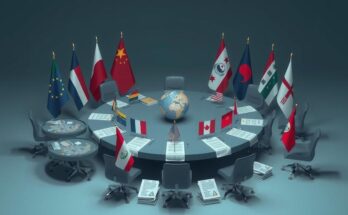South Sudan is on the brink of civil war, according to UNMISS head Nicholas Haysom. Indiscriminate attacks on civilians, rising ethnic tensions, and stalled diplomatic efforts highlight the escalating crisis. Haysom urges immediate recommitment to the 2018 peace deal to prevent further devastation.
South Sudan is dangerously close to spiraling into a civil war again, as escalating violence and unresolved political disputes deepen, according to a stark warning from the head of the UN Mission in South Sudan (UNMISS), Nicholas Haysom. Speaking at a press briefing from Juba via video link, Haysom outlined disturbing reports of attacks on civilians, widespread displacements, and rising ethnic tensions. He implored all factions to step back and prioritize peace before the nation falls into yet another devastating conflict.
“Any conflict would erase all the hard-fought gains achieved since the 2018 peace deal was signed,” Haysom cautioned, adding that this would have adverse effects beyond South Sudan, destabilizing the entire region that cannot withstand another conflict.
South Sudan, which became a nation in 2011 after gaining independence from Sudan, has faced ongoing instability and violence ever since. The civil war that broke out in 2013 saw clashes between supporters of President Salva Kiir and those loyal to his former deputy, Riek Machar. This war, characterized by ethnic violence and mass atrocities, only came to a halt with the fragile peace accord in 2018. Although this agreement brought some stability, ongoing delays in its implementation have left tensions simmering.
The latest outbreak of violence began on March 4, when a youth militia known as the White Army captured army barracks in Nasir, located in Upper Nile province. In response to this attack, government forces have conducted aerial bombardments on civilian populations, reportedly utilizing barrel bombs filled with highly flammable accelerants. “These indiscriminate attacks on civilians are resulting in significant casualties and horrific injuries, particularly burns affecting women and children,” Haysom noted, adding that at least 63,000 individuals have fled the region.
As violence escalates, both the White Army and national forces appear to be preparing for more confrontations, with alarming suggestions of child recruitment into armed factions. The request for foreign forces by the government has further intensified anxiety, recalling painful memories of South Sudan’s past civil wars.
Political tensions are also rising, as high-ranking officials linked to the Sudan People’s Liberation Movement in Opposition (SPLM-IO) have faced removal, detention or forced concealment. The increasing use of misinformation and hate speech is amplifying ethnic divisions and fear, complicating the path to reconciliation. “Given this grim situation, we are left with no conclusions other than assessing that South Sudan is teetering on the edge of a relapse into civil war,” emphasized the senior UN official.
The international community has not been idle, as Mr. Haysom reported that UNMISS has been actively working alongside regional partners such as the African Union and IGAD to forge a pathway toward peace. However, a planned high-level delegation visit from IGAD’s foreign ministers to Juba, intended to mediate between conflicting parties, was abruptly canceled by the South Sudanese government, leaving many puzzled. “This is a disappointing development at a time when diplomatic outreach is more crucial than ever,” he remarked.
Haysom urged political leaders in South Sudan to recommit to the 2018 peace agreement, respect ceasefire agreements, release detained officials, and engage in negotiations rather than resort to military actions. He specifically called for a meeting between President Kiir and First Vice President Machar, encouraging them to reaffirm their commitment to peace together. “The time for action is now because the alternative is too terrible to contemplate,” he concluded.
In summary, the situation in South Sudan remains precarious, with looming risks of a renewed civil war. UN chief Nicholas Haysom highlights a troubling rise in violence against civilians, alongside deepening ethnic tensions and political rivalries. The international community’s efforts to mediate have encountered significant setbacks, underscoring the urgency for South Sudan’s leaders to recommit to peace and dialogue before irreversible harm is done.
Original Source: www.miragenews.com




